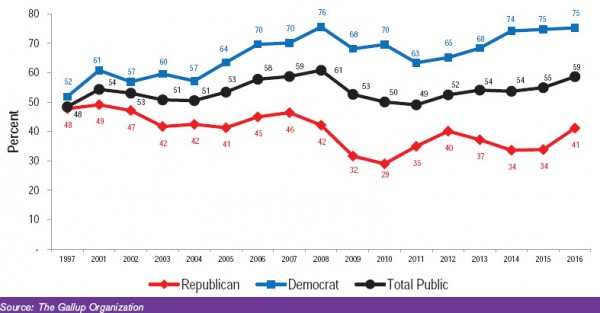
Donald Trump has called climate change a hoax, while Hillary Clinton has said she believes in climate science and supports efforts to reduce carbon emissions. Partisan divides on climate change have become almost a given and part of accepted party doctrine, but this was not always so. Just eight years ago, most Republican politicians supported climate change policy and Barack Obama and John McCain had nearly identical positions on the issue in 2008. However, after initial expectations that Obama would pass climate change legislation, gridlock set in and opinions about global warming became increasingly polarized.
To trace the growing partisan divide in attitudes about global warming, Riley Dunlap, Aaron McCright, and Jerrod Yarosh use Gallup polling data from 1997 to 2016 to show how public opinion regarding the existence, causes, and solutions to a warming planet have diverged between Democrats and Republicans, particularly during the Obama administration. Splits between self-identified Republicans and Democrats in believing whether or not climate change is happening has consistently been much higher in the past eight years than between 1997-2002. In 2016, about three-quarters of Democrats agreed that global warming is occurring, compared to only one-quarter of Republicans. In the past decade, Democrats have become increasingly more likely to believe that warming has been caused by human actions. While Democrats have become more concerned about the impacts of climate change (56% in 2016), Republicans’ concern has remained the same (around 25%).
The authors claim that political divides might be related to different attitudes about the media and scientists. In the past few years, about two-thirds of Republicans, compared to one-fifth of Democrats, felt that media coverage exaggerated global warming. This is a change from the relatively small partisan divide of 10 percentage points just twenty years ago. While there is growing scientific evidence and consensus on rising global temperatures, there have been increasing partisan splits with much fewer Republicans believing scientists agree on global warming.
Increasing partisan splits on environmental protection are particularly telling of broader ideological divides because there was recently relative agreement between the parties. The authors claim that this hardening of partisan and ideological positions means that bi-partisan legislation on reducing carbon emissions and other climate policies is unlikely in the near future, but views can and have changed in the past.

Comments